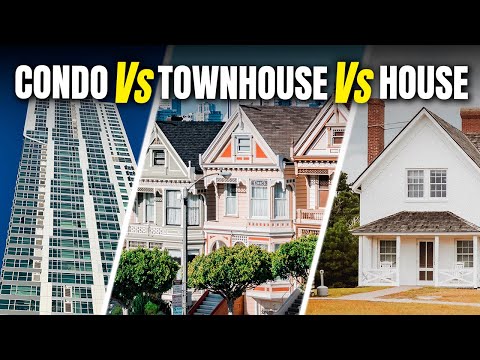The Great Debate: House vs Condo in 2024
When it comes to the great debate of house vs condo, every year nudges the arguments one way or the other. But who’s winning the tug of war in 2024, you might wonder? Well, let’s dive in and have a look.
Brief Overview of Housing Vs. Condo Trends in 2024
Real estate trends in 2024, manifest a fascinating shift. Between houses and condos, there’s a dance where potential buyers shuffle around the floor, swinging from one side to the other. On the one hand, there has been a surge in the number of folks opting for condos, willing to trade space for an easy-care lifestyle and potentially lower costs. On the flip side, the old American dream of owning a spacious freestanding home still sways many hearts.

Buyers’ Guide: Are Condos a Good Investment in 2024?
Facing the question, are condos a good investment? No worries. We’ve got you covered.
A Look at Condos as Budget-Friendly Housing Option
Condos have emerged as a budget-sensitive choice, proving particularly appealing for downscaling retirees, young couples, and urban dwellers. When it comes to buying a condo, compared to a thousand-square-foot house filled with stuff and responsibilities, a compact condo can start to shine like a glowing emerald. A key upside is that Condos tend To be less expensive than their single-family counterparts. A little less sprawl could mean a lot more for the bank balance.
The Challenges of Securing Condo Loans
However, the journey through the plains of condo investment isn’t devoid of bumps. Securing condo loans can turn out to be a more difficult task than anticipated. Some lenders pose tough conditions regarding owner-occupancy and loan-to-value ratios, multiplying the hoops you need to leap through.
Consideration of Loan-to-Value Ratios for Condo Purchases
The Loan-to-Value ratio (LTV) is yet another factor you need to consider seriously. While securing a loan for a house is relatively straight-forward, the scenario alters with condos. The LTV ratio tends to be tougher for condos, meaning you might need a chunkier down-payment before you start hearing the cha-ching of property ownership.

| Factors | House | Condo |
|---|---|---|
| Price | More expensive, typically have higher sale prices compared to Condos | Usually less expensive, relatively lower sale prices |
| Maintenance | Requires more self-maintenance, including outdoor spaces and appliances, which can be time-consuming and expensive | Lower maintenance, includes communal spaces and systems care are managed by the homeowner’s association |
| Flexibility | Flexible with modifications, home improvement, extensions, etc. | Restrictions on modifications, governed by the rules of the Condos’ homeowners association |
| Loan Approval | Easier to get loan approval, less strict requirements from lenders | Loans can be tougher to get, due to strict requirements from lenders in terms of owner occupancy and loan-to-value ratios |
| Living Space | Normally larger living space, includes private outdoor areas like gardens or backyards | Generally smaller than houses, sometimes lack private outdoor spaces |
| Community | Less communal structure and utilities, more privacy | More communal structure, shared common areas and amenities such as fitness center, pool etc. |
| Ownership | Ownership of both the dwelling and the land it sits on | Ownership only extends to the unit’s interior while common spaces and exterior belong to the Condo Association |
| Period of Stay | Ideal for individuals/families with a long term living plan in one location | Suitable for individuals or families with a plan to live in one area for an extended period |
| Ideal For | Ideal for those who desire a greater level of privacy, needing more space, and comfortable doing own maintenance | Perfect for those looking to downsize or those on a budget, who don’t mind living in close quarters with their neighbors |
Scrutinizing the Pros and Cons: House vs Condo
Pros of Buying a Single-Family Home
When drawing up the strength-weakness list in the house vs condo duel, one cannot disregard the advantages of going with a single-family home. It usually affords more privacy and outdoor space, and there’s generally more room to grow for those with children. Moreover, houses typically don’t fall prey to some of the conditions attached to condos, granting owners more freedom.
Cons of Opting for a House Over a Condo
But hold your horses! Such freedom comes at a price. While a house is often more spacious, it comes bound with more maintenance needs and typically higher utility bills. You might also face somewhat higher loan interest rates, due to the larger principal.
The Benefits of Choosing a Condo Over a House
Flip the coin, and you can see why buying a condo can be an attractive proposition. With a condo, you’re not sweating the small stuff – maintenance woes fall under the umbrella of condo management, leaving you to enjoy that Sunday morning coffee in peace. Plus, with smaller square footage usually comes a smaller price tag.
The Downside of Investing in a Condo
However, condos are not without their hazards. Condo Fees can be a nasty surprise if you’re not prepared, and some condos come with strict rules and regulations regarding what you can do with your own domicile. Once again, it’s the great house vs condo conundrum.

Deciding Factors: Buying a Condo vs Buying a House
Assessing Your Budget: Cost of a House vs Condo
Assessing your pocket depth is essential when it comes to buying a condo or opting for a house. On average, condos tend to be less expensive – a major point to consider.
Evaluating Maintenance Requirements: House vs Condo
When it comes to the scale of maintenance, the house vs condo debate isn’t black and white. Maintaining a house can be like caring for a buff man, demanding regular workouts to keep things running smoothly, while a condo is more like a low-maintenance hot girl who mainly needs an occasional update to keep her looking fabulous.
Analyzing Lifestyle Preferences in the Condo vs House Dichotomy
Lifestyle preference plays an essential role in deciding the house vs condo battle. If you favor quiet, the bustle of condo living might not be for you. On the contrary, if you’re an urbanite at heart, a house in the suburbs could seem like a lonely island.

Navigating Market Trends Amid the House vs Condo Tug of War
Understanding the House and Condo Market in 2024
2024 has seen an interesting shuffle in the real estate market. Both the house and condo markets are lively, but with their own distinct beats. There’s a rising trend in condo living in city centers, leading to a surge in condo developments.
Future Projections for House and Condo Markets
It’s impossible to predict with total accuracy, but the market’s projected trends suggest a continued uptick in condo popularity, while the lure of the suburban dream remains steady for families and those desiring more space.

Key Considerations in the Condo Vs House Decision
Evaluating Owner Occupancy Requirements
With condos, there’s often the thorny issue of owner occupancy requirements to consider. Some condos require a majority of units to be owner-occupied, which could throw a wrench into any plans of turning your potential unit into a rental property down the line.
How Long-Term Residency Goals Influence the House vs Condo Decision
Your long-term residency plans play a huge role in deciding the condo vs house dust-up. From the perspective of stability and no neighbor overhead, a house may seem appealing for a long-term stay. On the other hand, condos, with their lock-and-leave lifestyle, could be a more fitting choice if your future includes travel or moving for work.

Condo vs House: Which Fits Your Life Best in 2024?
By now, you might be leaning more towards a condo or house based on the factors discussed, but let’s drill down a bit further.
Condo or House: Making the Best Choice for Families
For families, especially ones with younger kids or pets, a house often provides a friendlier environment – more space and fewer neighborly interruptions. On the contrary, the simple convenience of a condo can be attractive for urbanite families valuing convenience and community.
Why You Might Consider a Condo over a House in 2024
In 2024, if you’re a busy professional, prefer urban living or you adore the convenience factor, a condominium might be your perfect match. Throw in the advantage of lesser maintenance, and condos start to be a real head turner.
Factors Behind Choosing a House over a Condo in 2024
However, should you desire space, privacy, a chance to cultivate your green thumb, and have firework-friendly Thanksgivings, a house could be your flavor.
Wrapping up the House vs Condo Debate
Parting Words on the Housing Vs. Condo Choice in 2024
From lifestyle preferences to financial status and long-term goals, an entire spectrum of considerations will swing your house vs condo decision. Yet, the essence at the core resides in analyzing your needs, desires, and situation.
Making Your Own Decision: The Final Thought on House vs Condo
The baffling house vs condo matter unveils the harsh truth that one size does not fit all. It boils down to what fits you like a glove. And that, my friend, only you can answer. In both cases, you’re putting down roots, creating a safe space, and investing in your future. And whichever you choose, let it be a place that feels like home. Good luck out there!
What are the disadvantages of a condo?
Well, living in a condo isn’t all sunshine and rainbows! Some of the drawbacks include homeowner association (HOA) fees, which can be pretty darn hefty. Not to mention, there can be restrictions on remodeling, pets, and even renting out your unit. Let’s face it, you’re sharing walls with neighbors which might not be everyone’s cup of tea.
Is condo living worth it?
Look, whether condo living is worth it really depends on your lifestyle and needs. If you’re the type who doesn’t fancy mowing the lawn and shoveling snow, then yeah, a condo might be worth it. The trade-off is paying those pesky HOA fees and dealing with potential neighbor noise.
Which is better a condo or apartment?
Deciding between a condo or apartment is like choosing between apples and oranges. An apartment offers a no-strings-attached living experience with fewer responsibilities. But a condo? It’s more of a long-term commitment but gives you a sense of ownership.
Why I prefer a condo over a house?
Here’s the thing, I’m partial to a condo over a house because it offers a great combo of homeownership perks without the hassle of extensive maintenance. It’s like having your cake and eating it too. Owning a condo sure feels like being part of a community, which isn’t everyone’s experience with a standalone house.
Why don’t condos increase in value?
Oh boy, who said condos don’t increase in value? This is a common myth. While it’s true some condos may not appreciate as quickly as single-family homes, many factors like location, demand, and improvements can really turn the tide.
Is it financially smart to buy a condo?
Buying a condo can be a smart move, no kidding! It could be a more affordable route to homeownership, and hey, the limited maintenance responsibilities aren’t half bad. But remember, it’s important to factor in all costs, including those HOA fees and any special assessments.
What are the red flags for buying a condo?
Red flags for buying a condo? Yikes, where should I start? High HOA fees, a poorly funded reserve fund, a history of special assessments, restrictions you can’t live with, and a high number of rentals can be some warning signs you don’t want to ignore.
What is the lifespan of a condominium?
As for a condominium’s lifespan, it’s akin to asking how long a piece of string is. It depends largely on the construction quality and ongoing maintenance. With good upkeep, a condo can last for decades, so it’s up to those darn HOAs to keep the ship sailing smoothly.
What are the pros and cons of condo living?
Condo living has its pros and cons like everything else. An appealing aspect is less maintenance, but those HOA fees can be a downer. Having close neighbors might be great for social butterflies but a bummer for introverts. It’s all about weighing these factors and seeing what ticks your boxes.
Are condos more quiet than apartments?
Are condos quieter than apartments? Well, it’s a toss-up. Both share walls so it boils down to the construction quality, rules of the complex, and simply put – the luck of the draw with your neighbors.
What are the red flags for buying a condo?
Singling out red flags when buying a condo includes sniffing out any high HOA fees, low occupancy rates, and a lack of a reserves fund. Whew! Also, beware of restrictions that may cramp your style.
Do condos lose their value?
Yes, just like a bouncy ball, condos can indeed lose their value. Factors like HOA problems, aging infrastructure, and even a shift in the local real estate market can take a bite out of a condo’s value.
Are condos really a good investment?
Is a condo a good investment? Well, it can be! Lower maintenance costs, communal amenities and affordability can make it quite the catch. But remember, not all condos are made equal. It’s important to do your homework before taking the plunge.
Is condo a better investment?
A condo can genuinely be a better investment, particularly for first-time homebuyers or those dating a less-demanding lifestyle. It also provides a stepping stone into the real estate market. However, as always, the specifics of the condo, the market trend, and financial considerations will ultimately dictate its investment potential.




